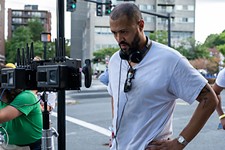Glass: A Portrait of Philip in Twelve Parts
It's appropriate – hell, it's necessary – that a documentary about Philip Glass provide sound as crisp and clear as the sharpest images onscreen, and this one does, with aural textures you can almost feel against your skin
Reviewed by Wayne Alan Brenner, Fri., May 1, 2009

Glass: A Portrait of Philip in Twelve Parts
Koch Lorber Films, $29.98Here's a beautiful look into the life and creative processes of one of the world's foremost composers, directed and photographed by Australian filmmaker Scott Hicks – likely best known as the screenwriter and director of Shine, a much different movie about a much different pianist. The way Hicks films his subject – technically precise captures of light and shadow and the interplay along every surface, movement in one scene balancing the stillness of an adjoining one, entire suites of sequence flowing like, hey, a Glass composition – he could be filming a commercial for a toilet-bowl cleaner, and it would be almost as beautiful. In fact, Hicks worked on TV commercials after Shine and before this expansive, intimate exploration of Philip Glass.
Glass himself, it's revealed near the beginning of this 2007 doc (which previously aired on PBS' American Masters), toiled in plumbing and taxicabs as a day job even after his work had been showcased at the Metropolitan Opera. You get to know these things in this documentary. You get to know of Glass and his family life, of his various wives, his sons, his brother and sister, his parents. Hicks provides the man in full – nearly as full as an outside perspective allows for a sometimes very private artist. (The second disc is loaded with three hours of additional interviews, performances, and a director's commentary.) And, of course, you get to know the music that pervades, that emanates from the composer's life.
It's appropriate – hell, it's necessary – that a documentary about Glass provide sound as crisp and clear as the sharpest images onscreen, and this one does, with aural textures you can almost feel against your skin. From the establishing scene of Glass riding Coney Island's Cyclone roller coaster (showing us from the get-go where the geographical center of the composer's universe is, while alluding to his music with the coaster car's wheels clacking rhythmically along the old wooden tracks' soaring hills and valleys), onward through his children-brightened living rooms, the city beyond, the New England seaside getaway, the various concert and rehearsal halls, all the way to Germany for the premiere of his score for the opera of J.M. Coetzee's Waiting for the Barbarians.
Glass, the film reminds us, has worked with Martin Scorsese and Errol Morris and Woody Allen, among other fine directors. His working – just being himself, documented – with Hicks on this film is hardly less satisfying for an interested viewer than any of those previous triumphs.











